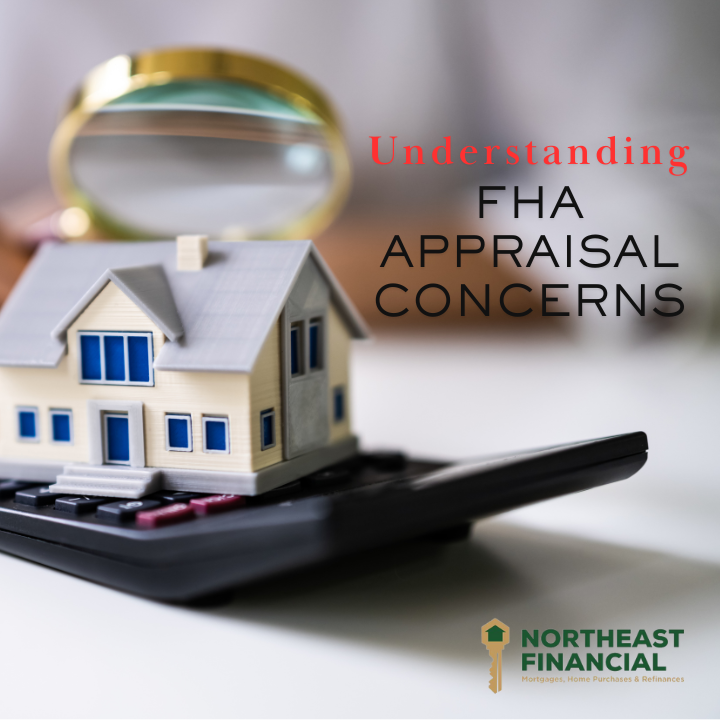
The Federal Housing Administration (FHA) loan program has empowered countless first-time homebuyers to achieve their dreams of homeownership. While the program offers more lenient requirements compared to Conventional loans, all properties financed through an FHA loan must meet specific Minimum Property Standards (MPS). Being aware of potential FHA appraisal concerns can help you anticipate challenges before starting your home search. Here’s what you need to know.
What Are FHA Minimum Property Standards?
FHA MPS ensure that homes financed through the program are safe, sound, and secure. This includes:
- Safe: The property must have a solid foundation, intact roof, and functioning wiring and plumbing, free from hazards that could endanger occupants.
- Sound: Homes must be free of major structural defects like extensive water damage, electrical issues, or HVAC malfunctions.
- Secure: Functional doors, windows, and locks are required to ensure the home provides adequate security.
 Common FHA Appraisal Concerns
Common FHA Appraisal Concerns
FHA appraisal concerns, or “red flags,” include safety hazards, health risks, and structural issues. Identifying these issues early can prevent financing delays or denials.
Structural Issues
- Cracked or crumbling foundations.
- Roofs with less than two years of remaining life or visible damage.
- Water damage, mold, or dampness in walls, ceilings, or crawl spaces.
- Missing handrails or cracked windows.
Health and Safety Risks
- Lead-based paint in homes built before 1978.
- Presence of asbestos or hazardous materials.
- Mold or evidence of pest infestations.
- Exposed electrical wiring or outdated systems.
Functional Systems
- Plumbing, electrical, and HVAC systems must function properly.
- Backed-up or corroded drains and low water pressure are flagged.
- Appliances or heating systems turned off or non-operational.
Specific FHA Requirements
- Peeling Paint: Any peeling or chipping paint in older homes must be remediated if deemed hazardous.
- Minimum Square Footage: Homes must have at least 500 square feet, including one bedroom.
- Roof Integrity: Roofs must be leak-free and durable for at least two more years.
- Crawl Spaces: Crawl spaces should be free of debris, moisture, and pests, with proper ventilation and sufficient clearance.
What Happens If an Appraisal Identifies Red Flags?
When an FHA appraiser identifies issues, they must be resolved before loan approval. Buyers and sellers typically negotiate repairs, but if a seller declines, buyers may need to explore non-FHA financing or walk away from the deal. Here’s how to address concerns:
- Sellers: Fix known issues before listing to appeal to FHA buyers.
 Buyers: Work with your agent to negotiate necessary repairs.
Buyers: Work with your agent to negotiate necessary repairs.- Disputes: If you disagree with an appraisal, you can submit an appeal for review.
How to Prepare for an FHA Appraisal
For sellers, addressing potential red flags beforehand can streamline the appraisal process and attract competitive offers. Use this checklist to prepare:
- Repair damaged roofs, foundations, or windows.
- Address signs of mold or pest infestations.
- Ensure all major systems (electrical, plumbing, HVAC) are operational.
- Eliminate peeling paint and repair broken fixtures.
FAQs About FHA Appraisals
What happens if a home fails an FHA appraisal? If a property doesn’t meet FHA standards, the appraiser will note required repairs in their report. Buyers and sellers must negotiate to address these issues or pursue alternative options.
Can appraisal findings be disputed? Yes, appraisal findings can be appealed by submitting additional evidence or correcting inaccuracies. However, there’s no guarantee of a reversal.
How long is an FHA appraisal valid? An FHA appraisal remains valid for 180 days.
Conclusion
Understanding FHA appraisal requirements can make the homebuying process smoother for both buyers and sellers. Anticipating and addressing potential red flags ensures that homes meet FHA standards, helping transactions move forward without delays. Whether you’re buying or selling, staying informed is key to navigating FHA appraisals successfully.

